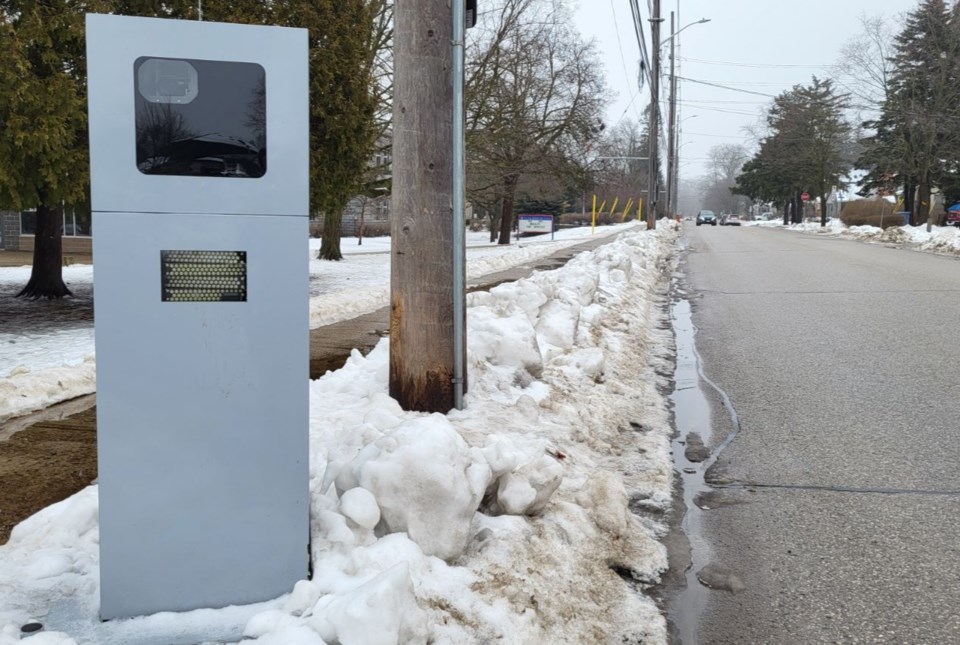“I never speed,” this Reddit user posted on the Guelph subreddit last fall. They were lying, of course.
“I guess technically I speed all the time, but never by more than 10 km/h,” they said in the very next line.
This was a preamble to outrage. This person had received a ticket from a speed enforcement camera placed in a school zone. How do we know it was near a school? They were dinged doing 44 kilometres per hour in a 30 zone. So another lie, he was doing 14 above the speed limit.
To paraphrase Night Court Judge Harold T. Stone, “That’s a $90 fine and time served.”
As bailiff Bull ushers our friend out of the courtroom with a quip, let’s look at a GuelphToday article from last month. The headline is “Automated speed cameras an expensive ‘fiasco’ for some Guelph drivers.” The “too long; didn’t read” is that people are ticked off that they can’t speed with impunity while missing the real scandal.
In a follow-up article, it was noted that the cameras had collected over $447,000 in revenue in the first five months of the program last year, but the City of Guelph’s take is only about $70,000, or 15.6 per cent. The rest of the money goes to “expenses for the program to the vendor, the processing centre operated by the City of Toronto, the provincial offences court system in Guelph, and city staff who run the program.”
So it’s not exactly squandered, but it’s clear there’s not a lot of financial benefit in trying to mitigate speeding around the city. It’s not a windfall that can resolve our budget issues, or fund further speed mitigation efforts, and if the goal is to get people to slow down then there seems to be some doubt about whether or not there’s any real impact on behaviour, but don’t take my word for it...
“We obviously want our kids to be as safe as possible, but instead of harshly penalizing people for driving 42 km/h instead of 39 km/h, the intention should be to curb actually dangerous driving during school hours,” said Matt, a Ward 5 resident.
That’s the cold and clinical mind of a difference engine at work; if 40 kilometres per hour is the maximum speed you can go then 41 kilometres per hour is speeding. Sorry, but we can’t program a robot to have discretion. Yet.
What’s clear from this reporting though, and its reaction on social media, is the near universal opinion that we are not to blame for own behaviour. It’s the cruel, inhuman speed enforcement camera and its city hall overlords that are to blame for your speeding, not your lead foot and casual disregard for the fact rules are rules and not suggestions.
So now we enter the essential problem of this and very discussion around the private automobile, nobody thinks the rules applies to them. No one thinks they’re part of the problem.
I’ve noted for years the unabashed coveting of one’s car. It’s not a tool, or a conveyance for moving a person from one point to the next, it’s an extension of self. Something we personalize and commodify. It’s a status symbol, and an expression of independence and success.
Even in the media we prioritize the problems of driving. Every Christmas time there’s a story about a parking issues for those shopping at the mall, the yo-yo of gas prices is an almost daily point of reporting, and in days gone by the Saturday paper featured an entire section dedicated to the buying and selling of automobiles. Public Transit only makes the news when it doesn’t work, but it’s systemic faults are only rarely a matter of note.
But I don’t want to turn this into a thing about public transit, because this is a story about personal responsibility, how our government tries to manage it and how we would rather complain about that than look into the mirror darkly and think about our own bad behaviour.
The whole notion of speed limits exists because we can’t be trusted to drive at a reasonable rate of speed even in a heavily-populated area. That’s why we’re fined for speeding, the assumption being that the effect on our pocketbook should be a mitigating factor on dangerous or reckless behaviour.
But instead, the city is to blame. We demand that they get speeding under control, that they create a system to mitigate that behaviour by installing a machine that measures when people are breaking the rules, and then those people are sanctioned monetarily in the hopes that they will correct their behaviour, which is the city’s fault.
“It’s certainly hurting me (financially), but it’s going to be hurting a whole lot of other people who are perhaps in a much more vulnerable place,” said Heather Thompson, another person interviewed in the Guelph Today article “This is harmful to people. It is vastly unfair.”
More hurtful than getting hit be a car? More unfair than having to recover in the hospital or rehab for months because someone was driving recklessly through your neighbourhood?
For years I’ve seen a negative reaction to numerous measures the City of Guelph has employed to get people to drive more slowly. Whether its turning Downey Road into a Shoots and Ladders board, or installing bollards around Stone Road Mall, nobody likes any of it and speed has only been getting worse. A study from CAA released at the beginning of the year says that nearly 9 in 10 Canadians are worried about speeding, and yet just over 1 out of 5 admit to occasionally doing that thing they worry about.
Might we now be at the point where we admit to ourselves that the problem with speed enforcement is we, the speeders? If past is prologue, I doubt it, but somewhere in a corporate office, some bigwig thanks you for your service.
